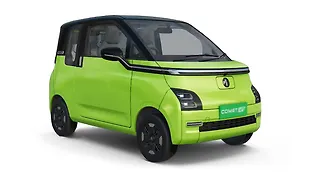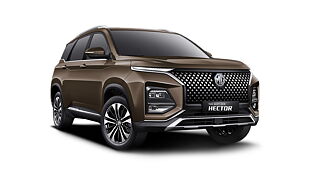What is it?
Why should I buy it?
Refined engine, smooth DCT, feature-loaded and spacious cabin
Why should I avoid it?
DCT could've been quicker, excessive body roll, not exciting to drive
What is it?

It’s been a year since MG marked its entry into the Indian market with the Hector. We drove it in the diesel guise and even pitted it against the Harrier diesel (you can read both over here). What we have here is the petrol derivative and this one is paired to a dual-clutch automatic gearbox. Available in just two trims – Smart and Sharp – this is the only automatic available in the Hector’s line-up for now. And no, this powertrain isn’t the 48V mild hybrid.

Much has been said about Hector’s styling already. It’s got road presence, thanks to its imposing grille garnished with chrome, beautifully-stacked headlamp cluster and body cladding all around. In profile, the Hector looks big with its squared-off wheel arches, tall roofline, and large overhangs. The rear gets an LED taillamp strip running across the tailgate, silver-finished skid plate with exhaust tip sticking out on the left, and a relatively narrow rear windscreen. There's no visual badging anywhere to differentiate this petrol-powered SUV from the diesel derivative. Sure, we also feel the 17-inch alloy wheels are undersized for the overall proportion of the SUV. But in our books that is the only quibble on a rather handsome-looking SUV.

How is it on the inside?

Stepping inside, you’d be surprised to notice the ease of ingress thanks to large doors and seat height. What stands out the most in the Hector’s otherwise conventional cabin is the large 10.4-inch touchscreen laid out on the centre dash. Even the quality of materials used in the black-grey cabin is not tacky by any standard. There are softer materials too while the fit and finish feel premium to a good extent. The visibility is great too. In fact, the large windows and relatively thin pillars lend a commanding driving position.

There is an ample amount of head and knee room, and both front seats get electric adjust. Overall the ergonomics are good, but the buttons like engine start/stop, or mirror adjustment are hidden behind the steering wheel making them difficult to access. Meanwhile, the instrument cluster gives out ample information and is also easy to read and navigate.

Moving to the rear seats, there’re acres of headroom and knee room for my size (I am 5.6’) while the massive panoramic sunroof elevates the roomy feel of the cabin. The 60:40 split second-row seats reclines and fold flat to expand the sufficiently large boot space of 587 litres. In terms of storage, there are four cup holders, stowage space on door pads but no proper flat surface to keep your mobile phone or wallet on the centre console.

Then there’s the lack of air-con buttons in the centre console since all the controls are now integrated into the large touchscreen. This tablet-like screen could do with better touch response though, which would help its usability and interaction greatly, especially when driving. And the buttons placed below the screen feels odd as the circular knob appears a volume rocker but it’s only a power button. Otherwise, there’s a plethora of information and control integrated into the screen. It also includes the iSmart connected system which not only provides internet connectivity inside the vehicle, but also allows you to know and control various vehicle functions (like vehicle health, driving characteristic, location and range) remotely through a smartphone.

In terms of features, the Hector we have here comes with rain-sensing wipers, ambient lighting, fast charging ports, powered tailgate, and a nice sounding eight-speaker Infinity sound system. It also gets six-airbags, all-four disc brakes, 360-degree camera, electronic handbrake, cruise control, auto-hold, and all-LED headlamps. But it misses out on some features like auto-dimming ORVMs, adjustable lumbar support, or wireless charger.

How does it drive?

Under the hood, there is a 1.5-litre four-cylinder turbocharged petrol engine. It produces 141bhp at 5000rpm and 250Nm of torque available from 2000rpm. Sending this output to front wheels only is a six-speed dual-clutch transmission. Crank up the motor and it settles downs in a silent idle. There are no vibrations either which makes you double-check whether the engine is running or not. Slot the lever into D, and let off the brake pedal and the Hector moves forward progressively.

On the move, the engine remains silent and tugs along easily with light throttle inputs. Straightaway, the gearbox continues to upshift seamlessly. Where the engine feels refined and unstrained below 2000rpm, there’s an evident whine when wrung past 2000rpm. There’s no turbo lag either and it is a high-revving motor, this one. So the Hector manages to pick up speed effortlessly thanks to relatively quick throttle response. With sedate driving, the engine feels right at home pottering along in city traffic without any hassle. Out on the highway, the engine manages to remain stress-free maintaining three-digit speeds.

But it is was when we drove it spritely that we noticed the response of the dual-clutch gearbox isn’t as quick as we expected it to be. There’s also a slight delay when you try to pick up speed after plodding over a speed-breaker. However, the DCT still remains smooth and seamless. But if you aren’t intending on driving it hurriedly, the powertrain is smooth, refined and gives no other reason to complain about. Of course, there’s the S mode where you can take control of the gear shifts. In this mode, the engine revs freely all the way up to 6500rpm following which the power deliveries tapers off. So this turbo-petrol is best driven in a sedate manner. Lastly, MG claims a fuel efficiency of 13.96kmpl for this motor for this powertrain.

Behind the wheel, the Hector wraps around you and doesn’t feel like a big car. Past the dead off-centre, the steering feels light on the move – be it in the city or on the highway. It is direct but not the most communicative. Especially when you tackle some twisties where the body roll prevents you from pushing it hard. Yes, the Hector has loads of body roll, so it’s not meant for corner carving. That said, the soft ride quality makes it feel comfy otherwise. It remains pliant on bad roads and only the sharp-edged potholes can send thud inside the cabin. That said, the occupants won’t be comfortable with the vertical movements over larger undulations at higher speeds. The straight-line stability is good too, and therefore, the Hector makes for a good long-distance traveller. On the flip side, the turning radius is the biggest in the segment and hence a tight U-turn feels like a task.

Should I buy one?

With increasing popularity for petrol-driven SUVs of late, the Hector offers a well-rounded package with its turbo-petrol and DCT combination. Apart from the good looks, striking road-presence, and a feature-loaded and spacious cabin, the Hector petrol-automatic is also silent, smooth and refined when driven in a composed manner. It also makes for a good mile muncher should you decide to take on the highways. If you look past the expectation of a quick DCT, inherent body roll, and the absence of an excitement factor (given that it’s a turbocharged-petrol), the Hector does make for a comfortable people mover. Also, since it is a part of our CarWale Long Term fleet now, we’ll be bringing more detailed reports on the Hector petrol-DCT in the coming months.
Where does it fit in?

Priced at Rs 17.56 lakh (ex-showroom), the Hector petrol-automatic is an alternative to the likes of the Kia Seltos GTX Plus DCT, Jeep Compass Longitude Plus DCT, and Nissan Kicks XV Turbo, but the Kicks gets a CVT automatic.
Pictures by Kapil Angane
Also Read:
MG Hector Diesel Manual First Drive Review
MG Hector vs Tata Harrier Diesel MT Comparison Test Review
MG Hector 1.5 DCT Petrol Automatic Long term Review: First Report

![MG Hector [2019-2021] Front View MG Hector [2019-2021] Front View](https://imgd.aeplcdn.com/642x361/n/cw/ec/49303/mg-hector-front-view0.jpeg?wm=1&q=80)
![MG Hector [2019-2021] Right Front Three Quarter MG Hector [2019-2021] Right Front Three Quarter](https://imgd.aeplcdn.com/642x361/n/cw/ec/49303/mg-hector-right-front-three-quarter19.jpeg?wm=1&q=80)
![MG Hector [2019-2021] Right Front Three Quarter MG Hector [2019-2021] Right Front Three Quarter](https://imgd.aeplcdn.com/642x361/n/cw/ec/49303/mg-hector-right-front-three-quarter23.jpeg?wm=1&q=80)
![MG Hector [2019-2021] Right Front Three Quarter MG Hector [2019-2021] Right Front Three Quarter](https://imgd.aeplcdn.com/642x361/n/cw/ec/49303/mg-hector-right-front-three-quarter157.jpeg?wm=1&q=80)
![MG Hector [2019-2021] Right Front Three Quarter MG Hector [2019-2021] Right Front Three Quarter](https://imgd.aeplcdn.com/642x361/n/cw/ec/49303/mg-hector-right-front-three-quarter171.jpeg?wm=1&q=80)
![MG Hector [2019-2021] Right Front Three Quarter MG Hector [2019-2021] Right Front Three Quarter](https://imgd.aeplcdn.com/642x361/n/cw/ec/49303/mg-hector-right-front-three-quarter182.jpeg?wm=1&q=80)
![MG Hector [2019-2021] Right Side View MG Hector [2019-2021] Right Side View](https://imgd.aeplcdn.com/642x361/n/cw/ec/49303/mg-hector-right-side-view22.jpeg?wm=1&q=80)
![MG Hector [2019-2021] Right Side View MG Hector [2019-2021] Right Side View](https://imgd.aeplcdn.com/642x361/n/cw/ec/49303/mg-hector-right-side-view158.jpeg?wm=1&q=80)
![MG Hector [2019-2021] Image MG Hector [2019-2021] Image](https://imgd.aeplcdn.com/272x153/cw/ec/36756/MG-Hector-Right-Front-Three-Quarter-166301.jpg?wm=0&q=80)
























